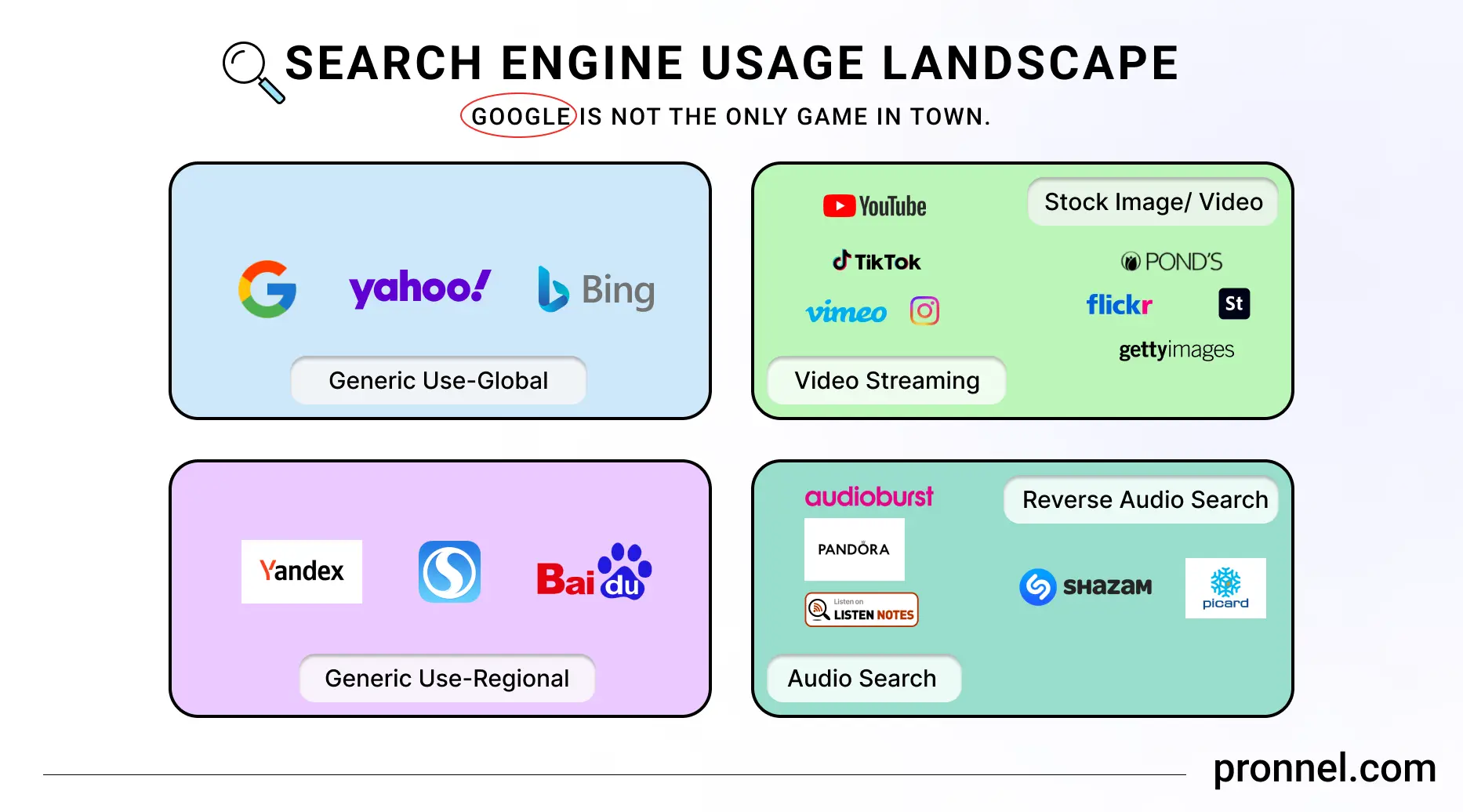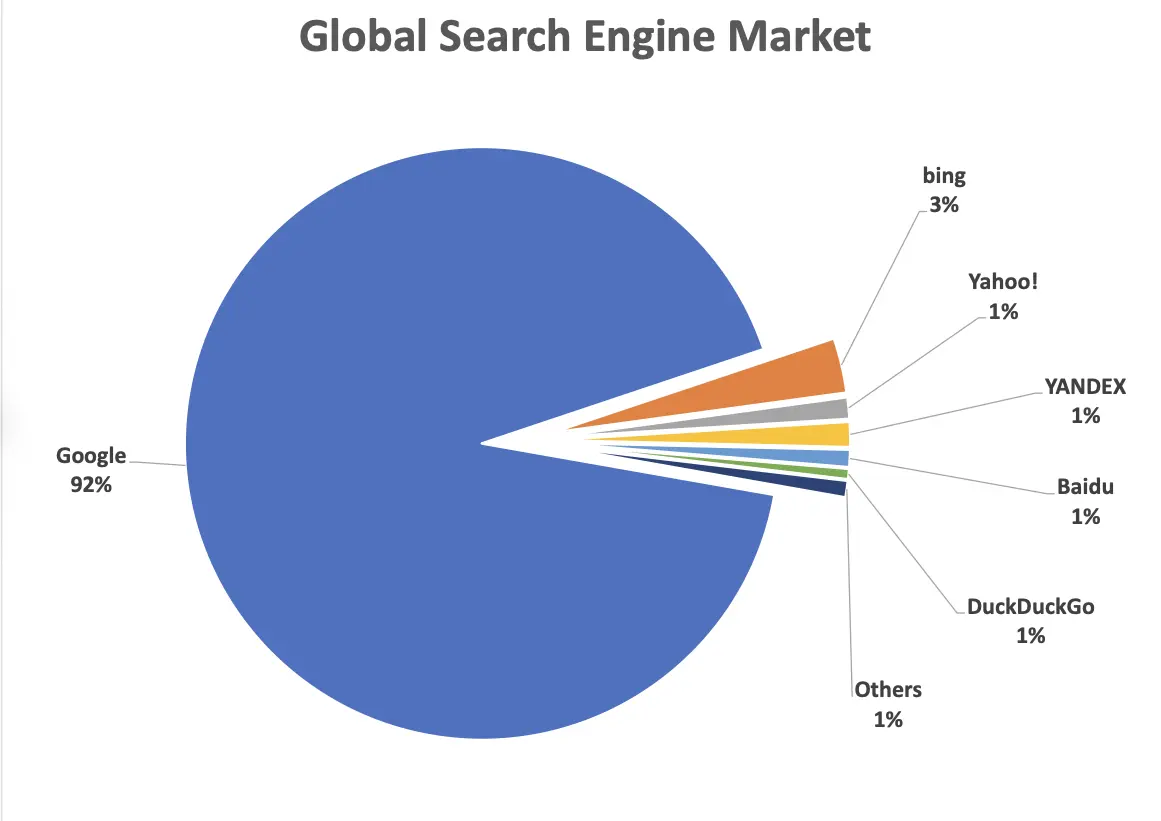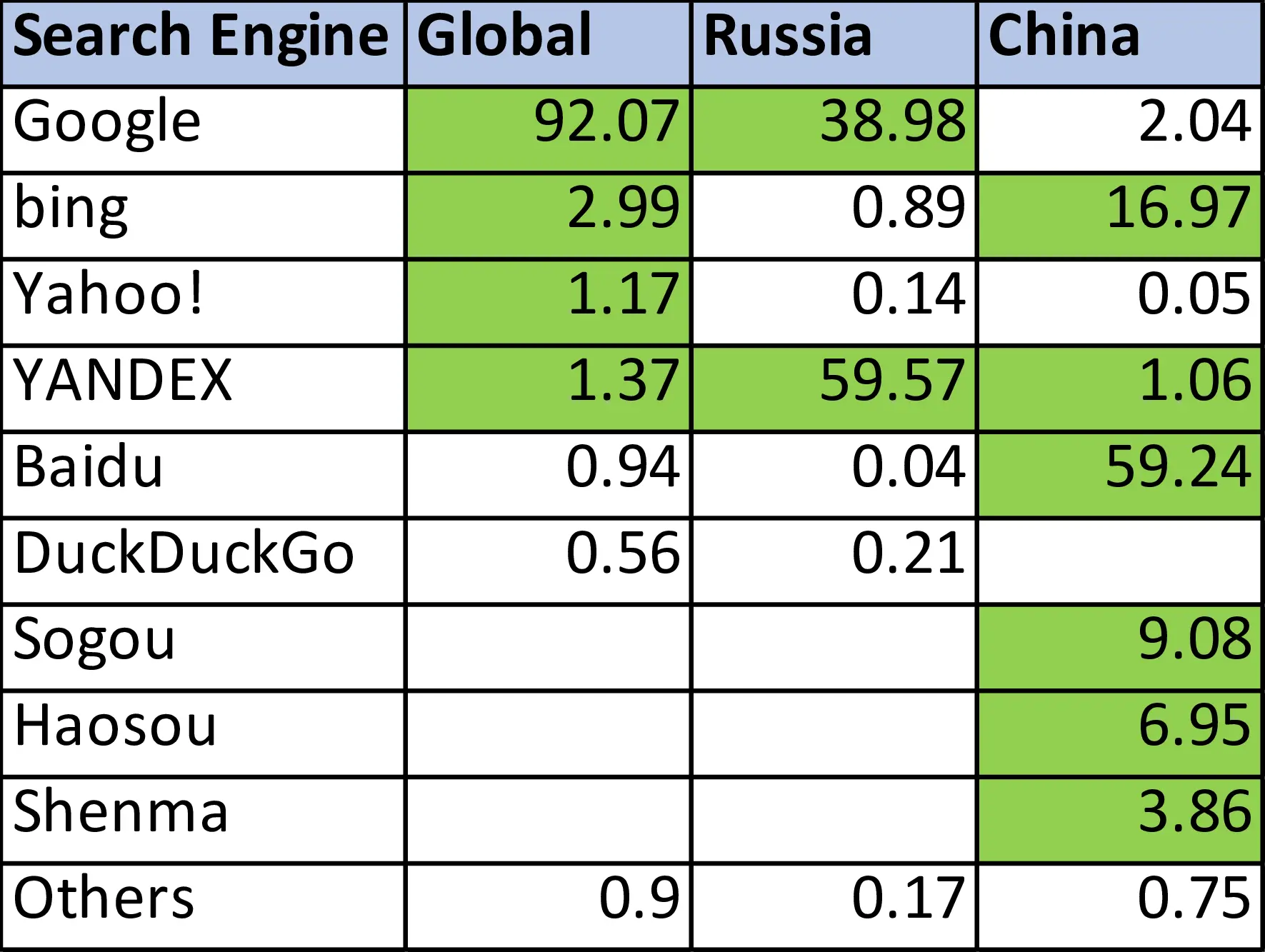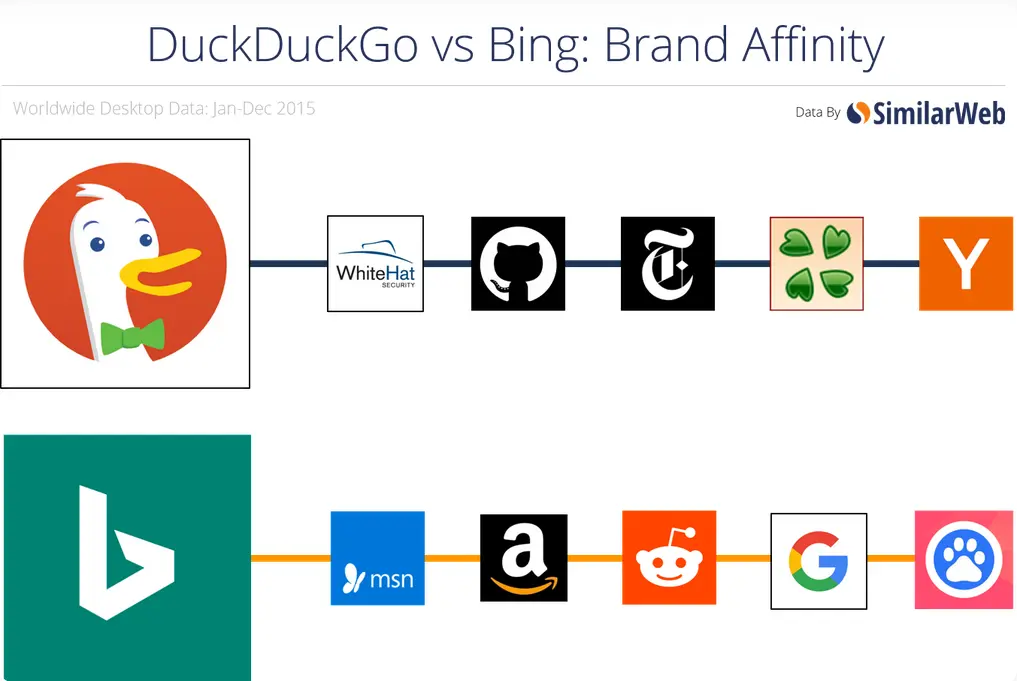Search Marketing 101- Google Is Not the Only Game In Town.


Table Of Contents
- Executive Summary (TL; DR)
- The Search Engine Landscape.
- Types of Lead Generation from Search Engines-and why Marketing ROI is so important.
- FAQ's
- Read Also
Executive Summary (TL; DR)
Any Marketer worth their salt will tell you Leads generated from Search Engines are worth their weight in Gold. Here are buyers searching with interest (high intent). If you can educate them or even intervene when they are searching for competitor products, the chances of conversion are dramatically higher than someone clicking on your content while passively scrolling on Social Media.
Ever since Google burst onto the scene in 1999, the word Google has literally become a synonym of search. But there’s more than Google as a Search Engine. In this article, we will delve into the Search Engine Marketing world, looking at types of Search Engines, and focusing on Organic (so called free Search Engine Marketing), the common assets possible, how they relate to Lead Generation and how different CTA’s can be mapped into a CRM for ease of tracking and calculating Marketing ROI.
Note, the focus of the article is not how to optimize your website, App Store or Business Listing for Search Engines and should be considered as a starting point for understanding. With the frequent updates to Search Engines it might be a good idea to refer to Developer Docs for the most recent status.
The Search Engine Landscape.
Most Marketers focus on Google, and in some cases on Bing. Makes sense as Google dominates with a Market share of > 92%, followed by Bing at about 3% and Yahoo Search at about 1.2%.
This trend is secular across the globe and optimizes resources. However, there are exceptions to bear in mind. There are three cases where you should think beyond the ordinary:
-
Geography of Operations
If you're targeting consumers in China or Russia (and by extension also relevant for the rest of the Russophile countries), then you need to be aware of the other Search Engines with high market shares. Operating in Russia and not considering Yandex, or not considering Baidu, Sogou, Haosou or Shenma in China would be negligent.
-
Niches Uses
While Google is the largest, for specific uses, people prefer other Search Engines more suited to their use. Did you know that YouTube accounts for almost 3% of global search volumes, almost equal to Bing.
Generic Search- Global Video Search Audio Search Google YouTube FindSound Bing TikTok AudioBurst Yahoo Instagram MP3Juice DuckDuckGo FacebookWatch ListenNotes Vimeo Pandora DailyMotion Generic Search- Local Video/ Images Search Reverse Audio Search YANDEX Adobe Stock Shazam Baidu GettyImages Picard Mobile Search-Local Flickr Sogou Pond5 Shenma Mobile Search-Global Haosou -
Specific User Personas
Search engines come in different shapes and sizes attracting different User Personas. While the general audience will tend to stick to the common search engines, there are a wide set of niche search engines which are preferred by users sensitive about their privacy. These individuals are akin to the ‘Innovators’ or ‘Early Adopters’ in the Technology Adoption Cycle. They will tend to be fiercely loyal and stick to the recommendations on these Search Engines. A little research will show that DuckDuckGo users tend to be very Tech savvy, have 12% lower bounce rates, and spend 69% more time on sites than say users of Bing. So if your target audience matches these criteria, giving DuckDuckGo a look may be interesting.
Similarly, Petal Search which is a native Search widget designed for the Harmony OS in Huawei phones has gained market share as Huawei phones have spread. If you are considering emerging markets in S. America, Africa, and others, it may be worth investigating Petal Search.
Types of Lead Generation from Search Engines-and why Marketing ROI is so important.
Search Marketing can be sub-divided into two sub-categories:
-
Organic Search or Search Engine Optimization (SEO)
Is the process of optimizing your website for achieving higher rankings in search engines for certain keywords that are relevant for your targeted consumer set. Because you do not pay for every click, many people consider it free. Unfortunately, the reality of life is nothing is free. Good content which will appear in a Google Knowledge Graph, within top five positions on Search Engines needs research, copy writing, graphic designer/ animation expert time, and even after all of this, you still need to work on Technical SEO. So, while invisible, good content generation is not an inexpensive exercise. And no matter how hard you work, short of having infinite resources, you will not rank high for every keyword. Therefore, all Marketing Teams will tend to focus resources on a core content set which is relevant for business. And the only way to measure efficacy is if you can track exactly which piece of content resulted in your Lead. Think of it analogous to a landlord having many properties on the Web. Unless you can track which properties are bringing how much moolah to the table, how will you know how much to reinvest in maintenance and customer support for each.
Long term, properly done SEO which leads Organic results is extremely lucrative with very high Marketing ROI’s. But the biggest drawback is that generating leads from SEO can be time consuming and can take many months to start delivering results. -
Search Engine Marketing (SEM) or Pay Per Click Model (PPC) or Paid Search Advertising (PSA)
In this model, in contrast to getting visibility and leads from Organic results, you end up paying Search Engines for placing sponsored content above and in-between Organic results. PPC Models yield faster results but entail constant outflow as you are Pay-Per-Click and consequently will have lower Marketing ROI. While some people look down on PPC Models, the fact is given the competitive milieu, sometimes it is just not possible to even land up on the first page for SERP’s, or it may take months before that happens. Will a business sit idle without revenue till then? Needless to say given the fact that firms are paying for each lead, nay, each click, Marketing Teams will desire to track the results for each lead to full conversion. Only then will they know granularly how efficiently leads are converted and how much revenue each Ad set is bringing in.
To effectively track real-world revenue numbers accurately on a lead basis, Marketing Teams will need to have an effective CRM that can capture all leads and see their transition through the Lead Funnel.
In the next article in our series- Search Marketing- Track Organic ROI, we will explore the different Organic assets which can generate leads, their possible Call-To-Action, conversion paths and how it is possible to capture relevant information against each lead without infringing on Privacy Laws to ultimately measure the ROI from these assets
FAQ’s
-
Why do I need a separate Lead Management System/ CRM for tracking conversion and ROI when I have Google Analytics?
Google Analytics can track your eCommerce revenue. Period. If you have set up correct tracking codes through Google Tag Manager or similar tools, you can be pretty sure of the numbers.
The problem is not all business are solely eCommerce. In fact, even now, eCommerce still trails Brick and Mortar sales. According to a Forbes report (38 E-Commerce Statistics Of 2023) by 2024 eCommerce share of Retail Revenues will be around 24%. So what should organizations that have an offline acquisition, or, online acquisition-offline conversion business models do?
An additional CRM/ Lead Management System like Pronnel can help bridge this gap. If you are using Pronnel, not only can you get a granular, lead by lead visibility to ultimate conversion (and you can enter your exact conversion amount), but also provide a tool to your Sales Team to keep track of leads in different stages of conversion and give your Sales Managers a tool to predict revenue. Even better, your Sales, Marketing and Finance Teams can collaborate and track the effectiveness of the pipeline. You will get access to Conversion Efficiency Reports for offline Sales Stages, ROAS, ROMI and much more. -
Will I get an approximate conversion amount like other CRM’s against a lead? How can I ensure accuracy of Lead Conversion amounts?
A good Lead Management System/ CRM allows you to track individual leads from start to Win/ Lose with associated fields of Lead Source, Campaign ID, etc. When your Team closes a lead, if they enter the correct data of closure amount, you will be able to obtain accurate Revenue Conversion numbers which will tie in with your ERP.
You can also tweak the system to provide revenue forecasts or track a nominal dollar amount against non-Revenue generating events like newsletter signups, Demo bookings, White Paper Download, etc.
Read Also
This blog is the fourth in the series on Lead Management. Dive deep and check out our other blogs:
Subscribe To Our Blogs
Get the latest blog notification into your email.


